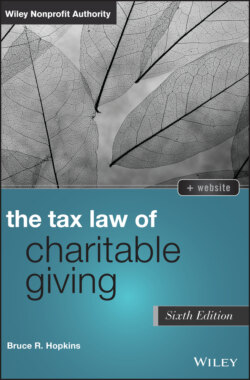Читать книгу The Tax Law of Charitable Giving - Bruce Hopkins R., Bruce R. Hopkins, David Middlebrook - Страница 59
(c) Safe Harbor Rules as to Public Charity Status
ОглавлениеRules similar to those concerning charitable status apply with regard to reliance on these databases in connection with organizations' public charity status.603
Grantors and contributors are not considered responsible for, or aware of, an act that results in the loss of classification of publicly supported charity status due to a change in financial support if the aggregate of grants or contributions received from a grantor or contributor for the tax year of the recipient organization in which the grant or contribution is received is 25 percent or less of the aggregate support received by the organization for the four tax years immediately preceding the tax year.604
This safe harbor is not available to a grantor or contributor who is in a position of authority with respect to the recipient organization (or who otherwise has the ability to exercise control over the recipient organization), or to a person standing in a relationship605 with respect to the person who is in a position of authority or control. The safe harbor also is inapplicable if the grantor or contributor has actual knowledge of the loss of classification of public charity status or after the date of public announcement that the organization ceases to qualify as a public charity.606
Private foundation grantors are not considered responsible for, or aware of, an act that results in a recipient organization's loss of classification as a public charity due to a change in financial support if the recipient organization has received a determination letter that it is a publicly supported charity and the organization is not controlled, directly or indirectly, by the private foundation. This safe harbor is inapplicable if the private foundation has actual knowledge of the loss of classification of public charity status or after the date of public announcement that the organization ceases to qualify as a public charity.607
A remedy under declaratory judgment procedures is available, in part, for cases involving a determination by the IRS with respect to the continuing qualification of an organization as a charitable entity or a public charity.608 This body of law nonetheless provides for the “validation of certain contributions” made during the pendency of a declaratory judgment proceeding; under this rule, the organization continues to be treated as an eligible charitable organization with respect to contributions from individuals (up to a maximum of $1,000 in the aggregate during the duration of the proceeding).609 Statutory protection for these contributions, if declaratory judgment is sought on the revocation action, begins on the date of publication of the revocation and ends on the date on which a court decision becomes final or court judgment is entered that the organization is not a charitable entity. This reliance, however, is not extended to any individual who was responsible, in whole or in part, for the activities or failures to act on the part of the organization that were the basis for the revocation.610
